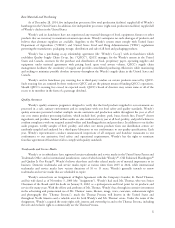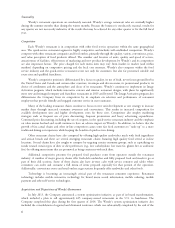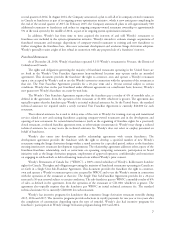Wendy's 2014 Annual Report Download - page 19
Download and view the complete annual report
Please find page 19 of the 2014 Wendy's annual report below. You can navigate through the pages in the report by either clicking on the pages listed below, or by using the keyword search tool below to find specific information within the annual report.Wendy’s leasing and ownership of significant amounts of real estate exposes it to possible liabilities and losses,
including liabilities associated with environmental matters.
As of December 28, 2014, Wendy’s leased or owned the land and/or the building for 957 Wendy’s restaurants.
Wendy’s also owned 230 and leased 488 properties that were either leased or subleased principally to franchisees as of
December 28, 2014. Accordingly, we are subject to all of the risks associated with leasing and owning real estate. In
particular, the value of our real property assets could decrease, and costs could increase, because of changes in the
investment climate for real estate, demographic trends, supply or demand for the use of the restaurants, which may
result from competition from similar restaurants in the area, and liability for environmental matters.
Wendy’s is subject to federal, state and local environmental, health and safety laws and regulations concerning
the discharge, storage, handling, release and disposal of hazardous or toxic substances. These environmental laws
provide for significant fines, penalties and liabilities, sometimes without regard to whether the owner, operator or
occupant of the property knew of, or was responsible for, the release or presence of the hazardous or toxic substances.
Third parties may also make claims against owners, operators or occupants of properties for personal injuries and
property damage associated with releases of, or actual or alleged exposure to, such substances. A number of our
restaurant sites were formerly gas stations or are adjacent to current or former gas stations, or were used for other
commercial activities that can create environmental impacts. We may also acquire or lease these types of sites in the
future. We have not conducted a comprehensive environmental review of all of our properties. We may not have
identified all of the potential environmental liabilities at our leased and owned properties, and any such liabilities
identified in the future could cause us to incur significant costs, including costs associated with litigation, fines or
clean-up responsibilities. In addition, we cannot predict what environmental legislation or regulations will be enacted
in the future or how existing or future laws or regulations will be administered or interpreted. We cannot predict the
amount of future expenditures that may be required in order to comply with any environmental laws or regulations or
to satisfy any such claims. See “Item 1. Business—General—Legal and Environmental Matters.”
Wendy’s leases real property generally for initial terms of 15 to 20 years with one or more options to extend the
term of the leases in consecutive five-year increments. Many leases provide that the landlord may increase the rent
over the term of the lease and any renewals thereof. Most leases require us to pay all of the costs of insurance, taxes,
maintenance and utilities. We generally cannot cancel these leases. If an existing or future restaurant is not profitable,
and we decide to close it, we may nonetheless be committed to perform our obligations under the applicable lease
including, among other things, paying the base rent for the balance of the lease term. In addition, as each lease
expires, we may fail to negotiate additional renewals or renewal options, either on commercially acceptable terms or at
all, which could cause us to close restaurants in desirable locations.
Due to the concentration of Wendy’s restaurants in particular geographic regions, our business results could be
impacted by the adverse economic conditions prevailing in those regions regardless of the state of the national
economy as a whole.
As of December 28, 2014, we and our franchisees operated Wendy’s restaurants in 50 states, the District of
Columbia and 28 foreign countries and territories. As of December 28, 2014 and as detailed in “Item 2. Properties,”
the 8 leading states by number of operating units were: Florida, Ohio, Texas, Georgia, California, Michigan,
Pennsylvania and North Carolina. This geographic concentration can cause economic conditions in particular areas of
the country to have a disproportionate impact on our overall results of operations. It is possible that adverse economic
conditions in states or regions that contain a high concentration of Wendy’s restaurants could have a material adverse
impact on our results of operations in the future.
Our operations are influenced by adverse weather conditions.
Weather, which is unpredictable, can impact Wendy’s restaurant sales. Harsh weather conditions that keep
customers from dining out result in lost opportunities for our restaurants. A heavy snowstorm in the Northeast or
Midwest or a hurricane in the Southeast can shut down an entire metropolitan area, resulting in a reduction in sales in
that area. Our first quarter includes winter months and historically has a lower level of sales at company-owned
restaurants. Because a significant portion of our restaurant operating costs is fixed or semi-fixed in nature, the loss of
sales during these periods hurts our operating margins, and can result in restaurant operating losses. For these reasons,
a quarter-to-quarter comparison may not be a good indication of Wendy’s performance or how it may perform in the
future.
15
























